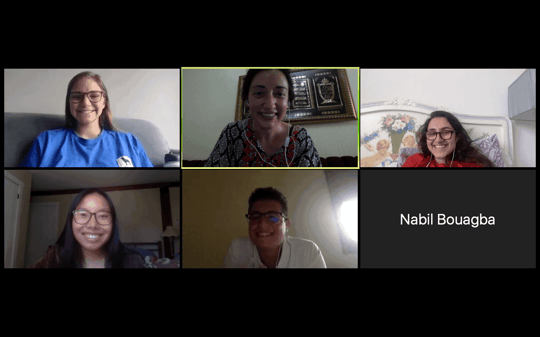Discussion with Law Students: Understanding Moroccan Culture

HAF Intern and UVA Student

Through a Zoom meeting with Moroccan law students from University Sidi Mohamed Ben Abdellah in Fes who have been trained to deliver pro bono legal aid to underserved persons, I had an amazing opportunity to discuss current topics and issues as well as acquire a better understanding of Moroccan culture and perspectives. Despite the virtual interactions, I felt a connection with the students. I did not feel hindered by the virtual setting, and I learned a lot more than I expected. One of the law students, Mohammed, was particularly lively and enthusiastic in sharing information about his culture and was open to learning from the American interns. He shared great stories about his life and what it was like to be Moroccan.
MEETING SET UP
The Zoom meeting began with introductions followed by a short game of trivia, which was a great way to break the ice and get to know more about university students in Morocco. We shared and explained our favorite holidays, traditional meals, and places. Then, we discussed family structures and individual rights as well as education. Although I have already thoroughly researched these topics, I gained more insight by listening to the law students’ concerns and opinions on these issues.
WHAT I LEARNED
Morocco is currently changing and improving. The government promotes boys’ and girls’ education by providing financial support for parents to fund their children’s education. However, some girls still don’t pursue studies at all, and others drop out. Fathers often think girls should focus on marriage instead of careers. There is also an issue with access to education, as it can be difficult financially and physically. After primary school, some students must wake up early and walk extremely far just to get to school. There is a lack of resources in many rural communities, especially internet access, and education brings a great financial burden to many families.
The other HAF interns and I asked about the law students’ experience with the Moroccan education system. The men said that their education was easy and relatively accessible. Those who attended private schools explained that students can more easily access higher level diplomas and good jobs. They all agreed that education is always easy for the rich. Mohammed also highlighted that education is a right protected by the constitution, so everyone is entitled to benefit from it. His beliefs directly contradict the stark realities of the financial, geographic, and cultural limitations that many Moroccans face. This statement really resonated with me, especially as our discussion transitioned into free higher education in Morocco compared to expensive education in America. The law students were perplexed by this notion. The resounding message was that everyone should have an equal opportunity and the right to benefit from higher education.
The law students shared their legal objectives that focus on women, divorce cases, and family reunification, among other issues. Women have only in recent years been granted the right to ask for divorce. However, the students highlighted the issue of financial control as many women are financially dependent on their husbands and are therefore, at times, forced to stay in unhappy and abusive marriages. Divorce is still considered taboo in many areas. Most rural areas value tradition and are not as open-minded. Women are often shamed if they ask for a divorce. Some women do not know, understand, or even accept that they have their own rights. They may also fear their husbands will beat them as they are told that the man is always right. The law students are working to organize visits to rural and semi-urban areas to give these communities the opportunity to benefit from free legal aid and to learn about the Moudawana (Moroccan Family Code), to raise awareness among women about legal protections, and to influence the mindsets of the next generation toward a more progressive Morocco.
Fortunately, men in urban areas are typically more aware of policies that advance women’s status in Morocco, thus learning, understanding, and even advocating at various levels for women’s rights. The law students we met with, and many others, provide pro bono legal assistance to women who encounter a variety of legal issues regarding their families, including family reunification, reconciliation, or mediation between wife and husband (or other family members). They remain impartial to ensure that they offer the best legal advice, and they are optimistic in their efforts to help teach communities about Moudawana and women’s rights, in addition to access to education.